New puppy owners often get overwhelmed by the puppy biting – and I do not blame you.
Like human babies, puppies explore the world with their mouth. It’s just a hard because young puppy teeth are like needles. And we want to convey it to them desperately so that they stop hurting us, and the good news is you can make big strides very quickly with your puppy’s biting.
As a professional trainer, one of my biggest bug bears is “It’s ok, they’ll grow out of it” or “When do they grow out of it?”
Because the assumption that they will grow out of it is sadly incorrect.
The growing out of it comes from a very, very small minority, who likely weren’t bad biters from the jump.
The Short Answer; They don’t grow out of puppy biting.
Puppy biting is a normal thing, they have no idea that they’re not meant to bite humans, or that it hurts us in the way that it does.
I know we want to hear that by X months of age puppy will stop, and you’ll be fine! But it’s just not the case and I won’t lie to you like that.
Puppies must be taught that they shouldn’t bite, but also what they should bite. Because biting is a normal behavior, it’s a natural behavior! And consequently, it needs to have an outlet that’s appropriate.
So let’s look at some ways we can stop a bad habit forming before those adult teeth come in….
Why Do Puppies Bite?
Puppies bite for a variety of reasons, primarily due to their natural instincts and biological development. Puppies are born with an innate need to explore their surroundings and gather information about the world around them. They use their mouths to investigate different textures and objects, which helps them learn about their environment.
Puppies also bite as part of play! Whilst they know we’re not another puppy, they have no idea that those wicked sharp needle teeth hurt us as much as they do, and that it breaks our incredibly fragile skin. They’re just doing what comes naturally.
During their early development, puppies experience the growth of their baby teeth, which typically begins around 4 weeks of age and results in a full set of 28 teeth by 6 weeks. As their teeth grow, puppies may bite more frequently in response to the physical sensation of the teeth emerging. In a biological sense, this biting behavior can be seen as a reaction to the physical discomfort associated with teething.
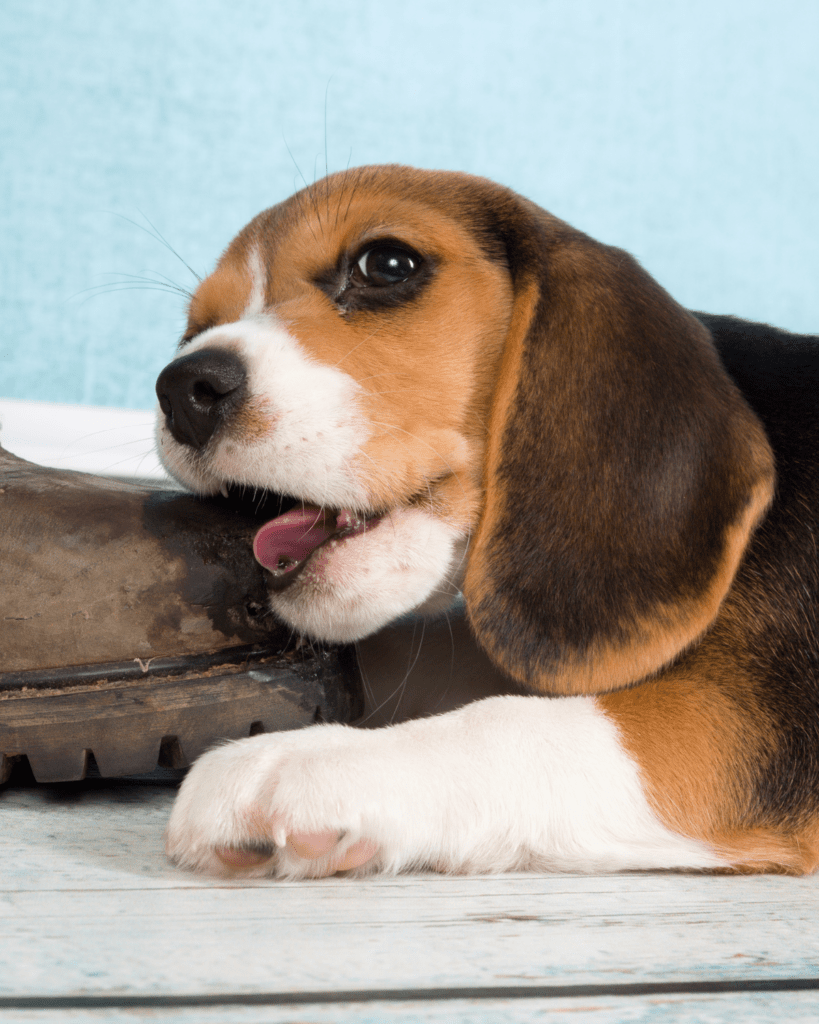
The Modern Approach To Puppy Biting
In modern dog training, we don’t teach our dogs not to bite, we teach them how to properly interact with people and their surroundings. so we:
- Teach them what they should bite
- Guide away from what they shouldn’t bite
- Show them what appropriate play with humans looks like.
It’s a pretty simple concept, but I’ll freely admit, it takes a bit of patience.
Things That Discourage Puppy From Nipping
A lot of the time, there is a lot of reason behind why your puppy bites, from exploring the world, to needing to chew, to wanting to play!
By reviewing body language, you can tell what is causing puppy bites. The most common reasons are below.
Appropriate Sleep
If your puppy is giving particularly hard bites, seems unable to focus generally and might be struggling with their bite inhibition, it’s probably a pattern (you may notice it happens at a similar time every night. Ask yourself “How long have they been awake?”.
Young pups need a surprisingly large amount of sleep (even more than adult dogs), at 18-20 hours per day of sleep. So, when that wildness kicks in, and their pupils blow, and they look like a possessed little demon? It’s likely they’re due (or over due) a nap.
Try settling them down for a sleep, and if it is a pattern and this happens around the same time every day? Look at adjusting your schedule or routine.
Appropriate Exercise; Physical & Mental
Exercising our puppies properly is also an important part, because a puppy with too much energy is also going to struggle to balance their energy. So ensuring that they’re walked and mentally stimulated. This will ensure your puppy has the best opportunity to succeed when it comes to learning what they are and aren’t meant to bite.
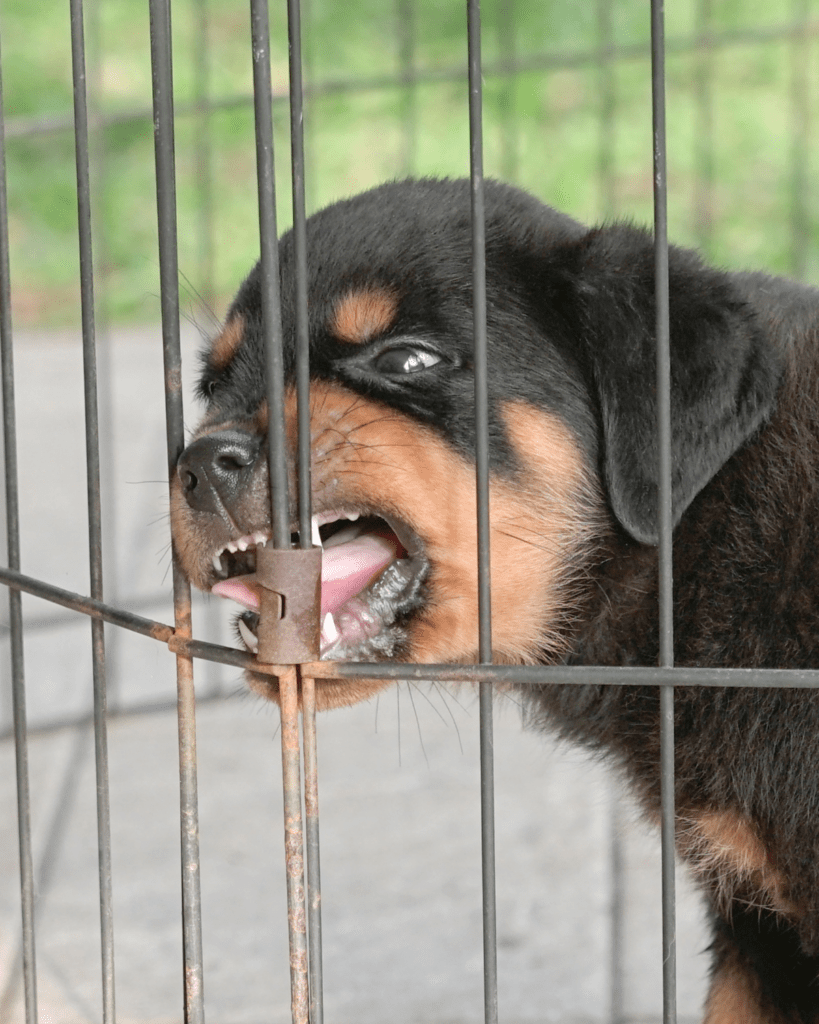
Management
Other than ensuring plenty of sleep, and optimum redirection and play (generally!) we can also minimise unwanted biting by controlling when they’re popped into their playpen or crate to give you some down time. (This said, please don’t use a crate as a way to avoid training, that will just create a whole bunch of other issues). Management options like these, baby gates and leashes allow us to create some space between us and the object of our puppy’s attention.
Please note – puppy biting is not a reason to bite
Redirect to a toy
If puppy is trying to play, or is exploring the world of human skin, chair legs, or your skirting boards (or even your walls!), then it might be that they need to get their bites out, grab a tug toy, or stuffed toy and go for a good, balanced play session! Ensure that puppies bite always meets the dog toys, and never skin, make the you super fun and exciting. That way, puppy will learn the toy is where all the reward is, and that skin doesn’t result in fun.
You may also find this beneficial to have a toy in each hand.
Match Textures
if your puppy is really enjoying chewing a particular thing, or a particular texture, as best you can try and match that texture! This gives them an outlet for the thing they love. Think of it like when you really, really want a chocolate bar and someone gives you an apple – it doesn’t quite get that kick. But if someone gives you a slice of chocolate cake? That’ll do the trick!
There are some good ideas here;

Edsel is a little pricey - but Edsel is the only toy that's lasted 5 years in my home with 3 large dogs. I don't let them sit and chomp on him like he's a bone, but we do play tug and fetch all the time.
He's the perfect intermediary for a puppy who's learning what to bite if that puppy likes human skin.
This toy also doesn't have an obnoxious squeaker! It's got a squeaker with a much better tone.
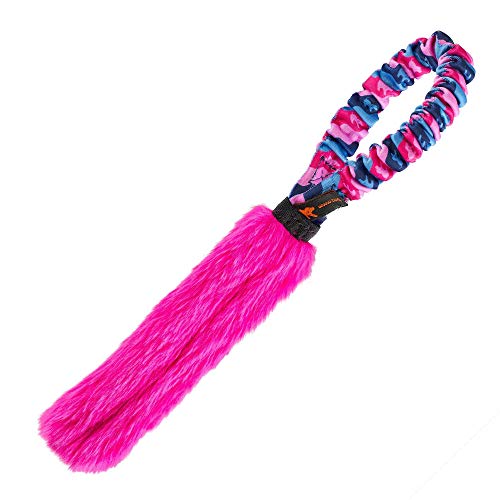
If your puppy is going for your sofa or blankets, and just wants to tug your trouser leg, grab this instead, and get a good play session going. These toys are durable and fluffy and fun. They're bungee'd in the cord, so they really take all that impact out.

These are root chunks from some heavy duty trees, and they crumble as opposed to splinter, so totally safe to ingest - which is awesome if you have a little pup who just can't leave the wooden furniture alone.
Redirect puppy to this, and you'll see puppy focus on the permitted chew, as opposed to the illegal chew, and it'll give pup the texture they're craving!
Appropriate Outlets (aka Give plenty of good chews!)
Things like bully sticks, soft toys, tug toys, chew roots and nylabones can be wonderful to redirect our dogs to. If they’re just looking to bite and chew (which is normal puppy behavior – and normal dog behavior too!), then redirecting them to a chew or a kong can be a fantastic option to actively make puppy stop biting you.
This is giving puppy plenty of appropriate outlets!
Things That Encourage Puppy To Bite Humans, Or Won’t Help
There’s a lot of myths, and a lot of old, outdated methods that are still perpetuated on the good ol’ internet and on social media, so let’s just outline a few things that won’t resolve puppy nipping and explain why, or what risks you’ll be exposing your young dogs too, and what bad behavior this could become.
Scolding or physically punish
When puppy nips saying “No!” or other stern tones, physically hitting, biting the ear, or similar.
Scolding is not going to help, and it’s actually likely to make puppy stop biting worse. When we scold a puppy they feel bad and they don’t want you to be mad at them, so they try harder to please you by doing what you want! So if you’re trying to get your puppy to stop biting humans by scolding them, then it will probably backfire because it makes them want to bite more – because they think that’s what you want. So don’t scold your puppy when they bite – or any other time.
Frankly, punishment isn’t needed in dog training at all.
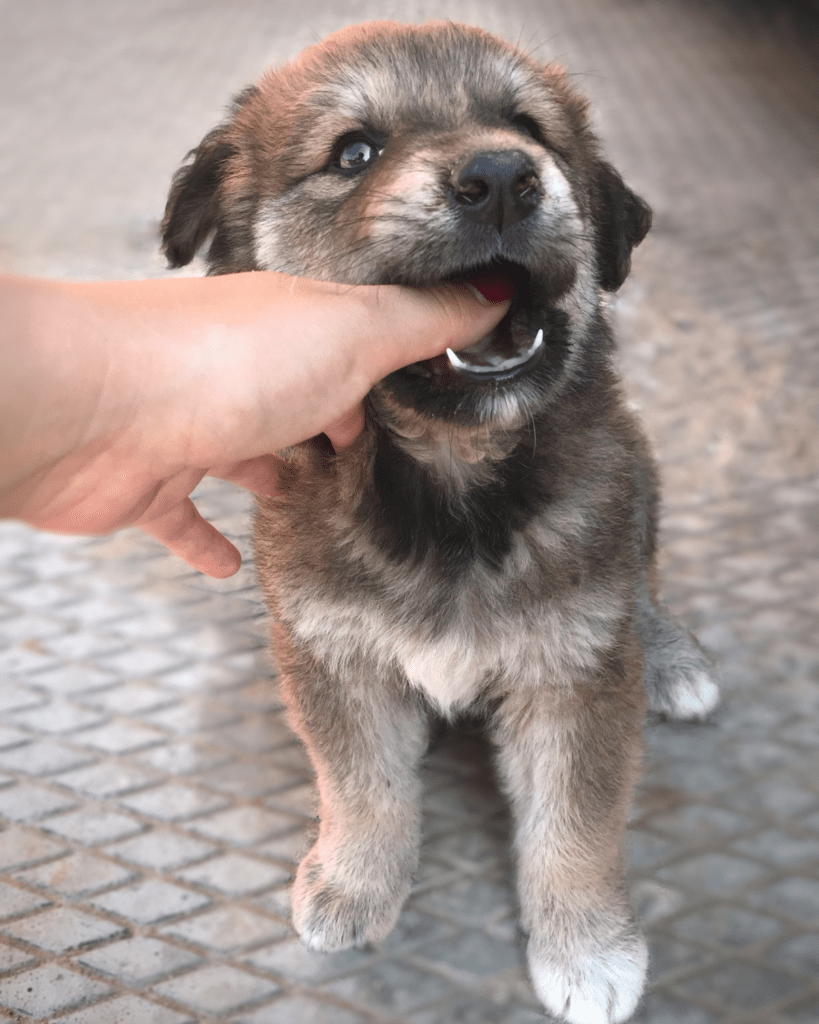
Squeaking or yelping
Squeaking or a high-pitched yelp will do one of two things…
- Simulate a squeaky toy. Which means that puppy is going to bite you more as biting you was an excellent choice!
- May scare them, and as a first thing your puppy learns about new humans is that sometimes they shout at him, and scare him? That’s definitely not going in the “progress” column of socialisation!
Good news is that there are plenty of other ways.
Allowing Unsupervised interaction with kids
Allowing unsupervised interaction between puppies and kids can worsen the issue of puppy biting. Puppies learn through play, and if kids play with them without supervision, they may unknowingly encourage biting behavior. And the more our puppy practices this behavior, the harder it will be to break.
Not to mention that kids may not recognize biting warning signs, leading to more bites. Puppies can also become overstimulated during playtime, exacerbating the issue. Finally, unsupervised interaction can pose safety risks for both the puppy and the child.
To prevent puppy biting and ensure safety, it’s essential to supervise all interactions between puppies and kids and teach children appropriate play behaviors.
This is hugely important, because puppies and kids are basically arch nemeses as what one sees as fear, the other sees as exciting, and vice versa, which means contact between kids and puppies needs to be heavily regulated.
Using their crate as punishment
It can lead to negative associations with the crate and cause anxiety and fear in your puppy. Instead, it’s important to use the crate as a place for your puppy to calm down and feel safe. If your puppy is biting, it’s best to redirect their behavior before it happens and provide them with appropriate toys or chews to chew on.
It’s important to not use the crate as a punishment area, especially if we want them to find their crate to be a relaxing environment.
Grab them by the collar
it can trigger a negative reaction and worsen the biting behavior. Grabbing a puppy by the collar can cause discomfort or pain, and the puppy may perceive it as a punishment. This can lead to fear, anxiety, and aggression towards the owner or others in the future. Instead, you can redirect your puppy’s biting behavior by offering a toy or chew bone to chew on.
Additionally, you can leave the area and ignore the puppy for a few moments if they continue to bite, which teaches them that biting results in a loss of attention and playtime.
Is Biting An Aggressive Behavior?
Typically, no.
It’s very unlikely that young puppies genuinely want to be ‘aggressive’. It’s just a case of dog owners teaching what is and isn’t an appropriate toy or outlet for those super sharp baby teeth. In incredibly rare instances a puppy may be deemed aggressive, but they’re basically a unicorn, I’ve heard of this happening, but never seen it with my own two eyes and never had enough data to actually settle the argument my mind that a puppy can truly be aggressive.
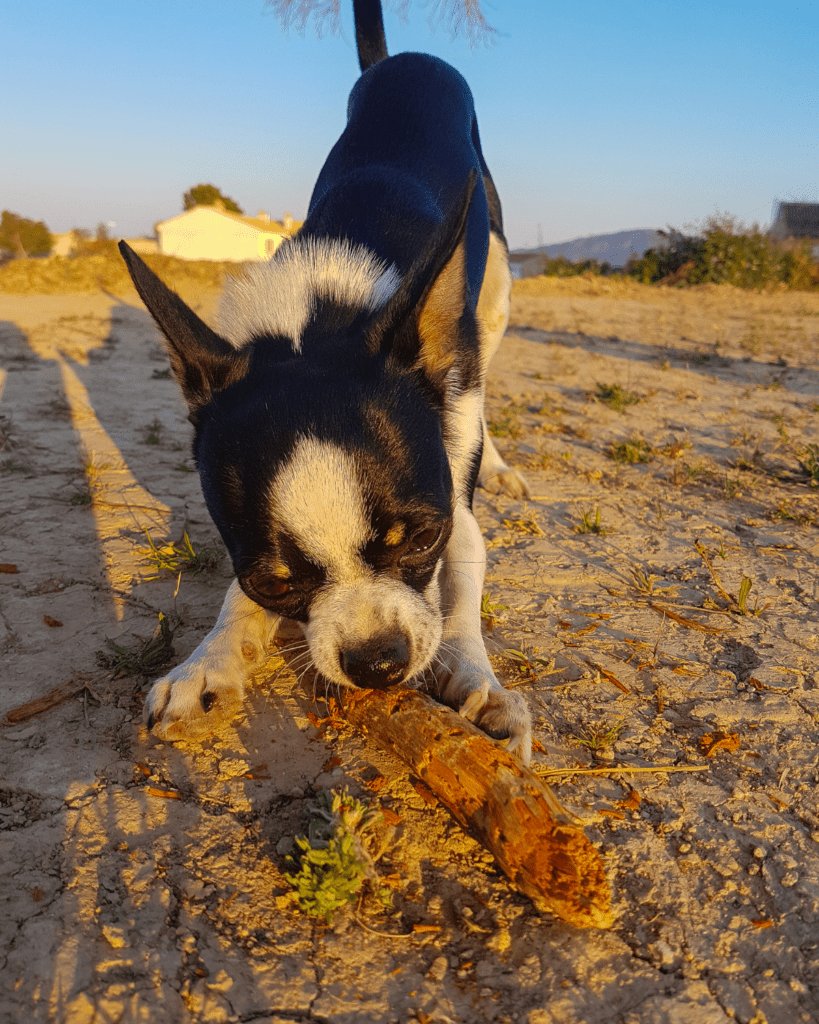
Be Aware of Teething
Teething happens around 4 months of age, and your dog will start dropping those wicked sharp teeth, and growing in their more blunt adult teeth. This is what I think most people mistake for the “biting phase” because this does go away! But the “puppy biting” doesn’t.
Biting and puppy mouthing gets considerably worse during the time they’re teething, because (ironically) the only way they can soothe those sore teeth and gums is to chew. So, as the strength of their bite increases, your puppy drops their fist set to make space for their permanent teeth! Personally, I try to ensure that puppies learn before this period that they have learned appropriate behavior.
Remember to get Family members on board
It can be really tough to be pet parents when you’re all doing different things. So make sure to chat to everyone who will be in puppy’s life and guide them on these principles too
Oh, and…
Here are some awesome chews & toys to harness that biting behavior into the right place!
Great Puppy Chews For Teaching Puppy Not To Bite

These chews are really interesting, they last for ages, and dogs tend to love them.
We love these as a special treat, we don't give them often, but they really do help relax dogs and bring them to a stage I call "Chew drunk", because chewing releases endorphins for dogs and soothes them. So these are a wonderful choice.
(Warning, watch your pup the first few times, strong chewers or greedy guts can be tempted to chomp it into a few pieces and just swallow it down)

These are another single ingredient chew that's bound to keep puppy focused and entertained. Whilst chews are never a replacement for a play session, this one comes close because of just how darn tasty they are!

These are root chunks from some heavy duty trees, and they crumble as opposed to splinter, so totally safe to ingest - which is awesome if you have a little pup who just can't leave the wooden furniture alone.
Redirect puppy to this, and you'll see puppy focus on the permitted chew, as opposed to the illegal chew, and it'll give pup the texture they're craving!
Great Puppy Toys For Teaching Puppy Not To Bite

This is great for interacting with puppy who wants to play and wants to bite! It allows pup to really engage with you and is perfect for redirecting and even better? The bungee takes your pup's yank out of it for your shoulders.

Edsel is a little pricey - but Edsel is the only toy that's lasted 5 years in my home with 3 large dogs. I don't let them sit and chomp on him like he's a bone, but we do play tug and fetch all the time.
He's the perfect intermediary for a puppy who's learning what to bite if that puppy likes human skin.
This toy also doesn't have an obnoxious squeaker! It's got a squeaker with a much better tone.
Final Tips For Bitey Puppy
The last thing we have to think about is that this is a process, it needs to be in simple steps, and that change still won’t happen over night. This new home, and new experiences is all totally weird, and learning takes time.
- Be Consistent – I know it’s tough. I really do, but you need to use this method consistently for at least a week to see results. Throwing all sorts of methods at the problem to see what sticks is just going to confuse puppy.
- Keep It Positive – There is zero reason to punish our dogs. They’re simply trying to learn how to live in our world, we make the rules, and we’ve got to take the responsibility when it doesn’t go to plan. So stick to positive reinforcement!
- More Yes, Less No. – It’s hard to stay positive. I know, but when you manage to reward the right thing and find the fun in it, we’ll see puppy learn far quicker, and you’ll feel so much better about the process too. reward good behavior and you’ll see more good habits forming.
- Predict The Pattern – There is a pattern. You may see that there is a witching hour, or a certain pattern where puppy is pretty much just wild. Learn to predict the pattern, and make changes. This might me moving a nap, or shortening a walk. Sometimes we need to experiment just a little to find our solution.
Puppies Bite, But Let’s Make Sure They Bite That Toy & Not You.
it’s essential to remember that puppies bite as a natural part of their development and exploration of the world around them. However, it’s our responsibility as pet owners to guide them towards healthy and safe habits, ensuring they bite their toys and not us.
By providing them with appropriate toys and chews, and teaching them what’s okay, we can redirect their biting behavior and create a positive environment for both the puppy and ourselves.
If you need help turning your puppy into a good dog and want a professional dog trainers help, but at a fraction of the cost? Pupdates will walk you through the whole process of raising your puppy – the right way.

Author, Ali Smith
Ali Smith is a professional, qualified, and multi-award winning trainer is the founder of rebarkable. She has always believed animals deserve kindness and champions force free methods. Believing that dog guardians will all choose the kindest options if proper information is provided, she aims to help all dog guardians who need it and make dog training as accessible as possible
Ali lives win Maryland, US with her husband and her three dogs.
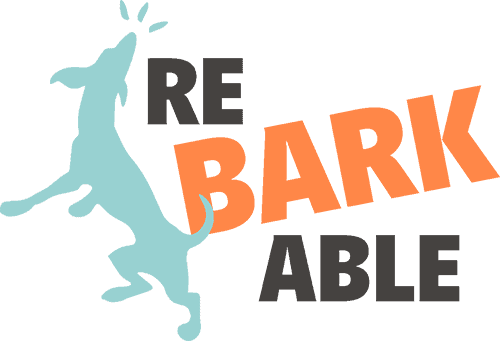

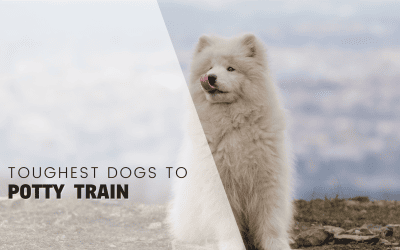

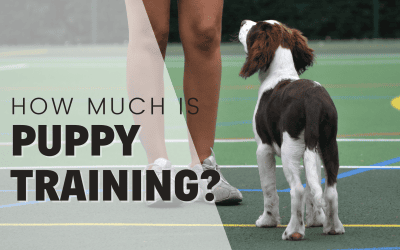

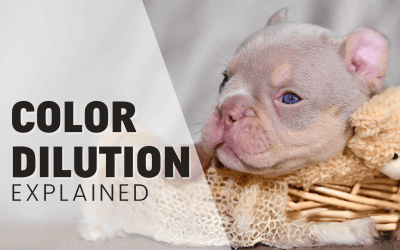
0 Comments